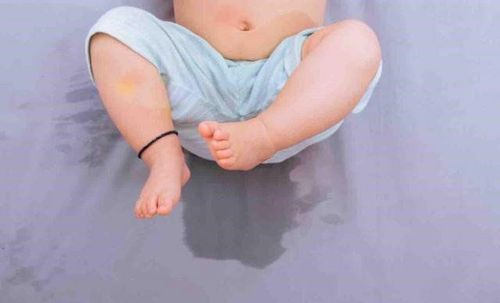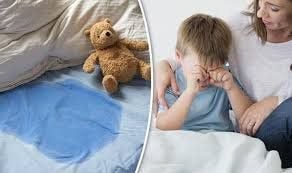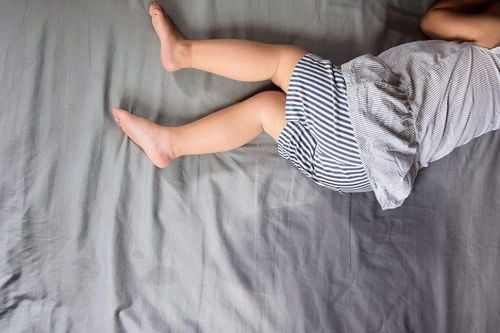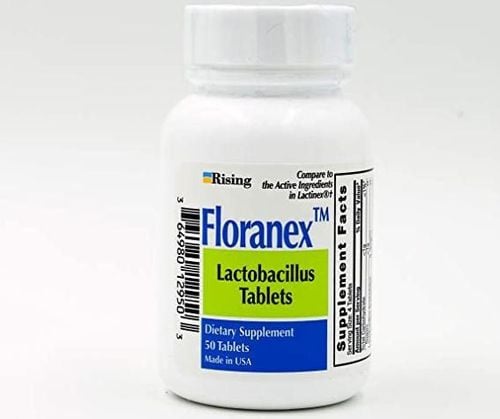This is an automatically translated article.
The article was professionally consulted with - Specialist I, Resident Doctor Dang Thi Ngoan - Pediatrician - Neonatologist - Department of Pediatrics - Neonatology - Vinmec Ha Long International General Hospital.Although bedwetting can be a symptom of an underlying medical condition, most children with bedwetting are otherwise healthy. In fact, only about 1% of children who regularly wet the bed are a symptom of some underlying medical condition. Bedwetting does not mean that the child does it on purpose, and the child is not lazy or intentionally disobedient to parents.
1. Types of bedwetting
There are two types of bedwetting: primary and secondary.Primary bedwetting is bed-wetting that occurs in childhood and lasts for a long time, even in children who have never slept with a dry bed at night. Secondary bedwetting is when a child has been bed-free for at least 6 months, but then begins to wet the bed again.

2. What causes primary bedwetting?
It may be due to one or a combination of the following:The child cannot hold urine for the whole night. The child does not wake up when the bladder is full. Children increase urine production in the evening and at night. Children have less habit of going to the toilet during the day. Many children because they are so busy playing that they have the habit of ignoring the feeling of needing to urinate and holding back the urine until they can't hold it anymore before they go to the bathroom. When the child holds the urine, parents will see that the child does not cross his legs, strain his face, twist, squat and use his hands to hold the groin so that the child holds the urine.
3. What causes secondary bedwetting?
Secondary bedwetting can be a sign of a physical illness or an emotional problem. In addition to nocturnal enuresis, children with secondary bedwetting are more likely to have other symptoms, such as children with daytime bedwetting. Common causes of secondary bedwetting include:Urinary tract infections: leading to bladder irritation that causes pain or discomfort while urinating, constant need to urinate, and frequent urination. Urinary tract infections in children can indicate other problems, like abnormal anatomy of the urinary system. Diabetes: People with diabetes have high blood sugar so the body increases water through the urine to try to get rid of the sugar in the blood. Frequent urination is a common symptom of diabetes. Abnormal anatomy: Abnormalities in organs, muscles, or nerves involved in the production and removal of urine from the body can cause urinary incontinence or problems on urinary tract diseases that trigger symptoms of bedwetting. Nervous system problems: Abnormalities in the nervous system, injury or disease of the nervous system, can upset the balance of nerves that control urination. Emotional problems: Children who live in families have a stressful life, like parents have conflicts and this sometimes leads to bed-wetting. Or major changes, like starting school, adding a family member or moving into a new home, are other common stresses that can also cause bedwetting. In addition, parents should also be aware that children who are being physically or sexually abused will sometimes start bedwetting even though the child did not have bedwetting before.
4. Is bedwetting hereditary?
Bedwetting does not run in families, even though a child's parents have experienced it as well. Most children will stop bedwetting around the same age that their parents did.5. When should parents take their children to the doctor?
Most children with bedwetting have no other symptoms. However, if the child has the following signs, parents need to take the child to a health facility for examination:Increased frequency of bedwetting The child feels uncomfortable or burning or cries when urinating The child does not want to urinate because urinary tract pain Cloudy or pink urine, or blood stains on a child's underwear or pajamas Child goes to the bathroom more often than usual Child is irritable

6. Children wetting a lot to do?
If the child has been determined to not have an underlying medical condition causing the bedwetting, the child will not need to be treated. After this, the symptoms of bedwetting tend to subside and disappear on their own. However, if, after talking with your doctor, you decide to treat your child with medication, here are some options. Currently, there are two FDA-approved drugs specifically for the treatment of bedwetting, DDAVP and Tofranil. Other drugs sometimes used to treat bedwetting include Ditropan and Levsin.Drug treatment does not work for all patients and these drugs have some common side effects. Therefore, you need to discuss carefully with your doctor to consider whether drug treatment is right for your child.
As a key area of Vinmec Health system, Pediatrics Department always brings satisfaction to customers and is highly appreciated by industry experts with:
Gathering a team of top doctors and nurses in Pediatrics : consists of leading experts with high professional qualifications (professors, associate professors, doctorates, masters), experienced, worked at major hospitals such as Bach Mai, 108.. Doctors All doctors are well-trained, professional, conscientious, knowledgeable about young psychology. In addition to domestic pediatric specialists, the Department of Pediatrics also has the participation of foreign experts (Japan, Singapore, Australia, USA) who are always pioneers in applying the latest and most effective treatment regimens. . Comprehensive services: In the field of Pediatrics, Vinmec provides a series of continuous medical examination and treatment services from Newborn to Pediatric and Vaccine,... according to international standards to help parents take care of their baby's health from birth to childhood. from birth to adulthood Specialized techniques: Vinmec has successfully deployed many specialized techniques to make the treatment of difficult diseases in Pediatrics more effective: neurosurgery - skull surgery, stem cell transplantation. blood in cancer treatment. Professional care: In addition to understanding children's psychology, Vinmec also pays special attention to the children's play space, helping them to have fun and get used to the hospital's environment, cooperate in treatment, improve the efficiency of medical treatment.
Please dial HOTLINE for more information or register for an appointment HERE. Download MyVinmec app to make appointments faster and to manage your bookings easily.
Article reference source: webmd.com













